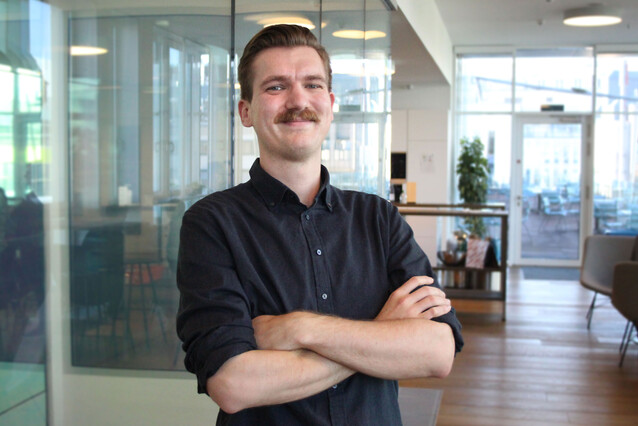Lauwers Award for Felix Holstein
During their doctoral studies, students in the Vienna BioCenter PhD Program present their research in Monday Seminar talks to the Vienna BioCenter community, thereby collecting feedback to advance their projects. Every year, the best presentation is rewarded with the Lauwers Award. This year, we congratulate Felix Holstein from Anna Obenauf’s lab for his excellent talk.
Felix Holstein’s first experience at the Vienna BioCenter dates back to his school years, as he joined the Institute of Molecular Biotechnology of the Austrian Academy of Sciences (IMBA) for a summer internship.
“My time at IMBA seeded my ambition to become a scientist. I knew very little of molecular biology back then, and I found it fascinating to discover how things worked – some that now seem simple, like genotyping using PCR,” Holstein says. “I came back to IMBA during my bachelor’s studies for a second internship, and after my Master’s thesis in Munich, I applied to the Vienna BioCenter PhD Program and started my PhD at the IMP. I knew it as an excellent place for research, and the project opportunities were outstanding.”
In 2017, he joined the lab of Anna Obenauf, as the junior group was still in its effervescent beginnings. Since then, the Obenauf lab has bloomed into a prolific senior group.
Felix Holstein’s project aims to understand what regulates the expression of the major histocompatibility complex class I (or MHC I) – a protein complex which mediates interactions between cells in the body and cells of the immune system. MHC I presents protein fragments from the cells to the outside. If the proteins originate from infectious agents or mutated genes, the affected cells are recognised and eradicated by immune cells. This process is crucial to suppress infections and eliminate cancerous cells. For his thesis, Felix Holstein screened for novel regulators of MHC I expression using CRISPR/Cas9. He was able to validate some of the hits of the screen, identifying novel regulators of MHC I and its activity. He is now working to uncover the underlying molecular mechanisms of this regulation. Ultimately, this could lead to a better understanding of how to improve anti-tumour immunity.
When it comes to preparing a presentation, Holstein can count on his colleagues for support. “Before a public presentation, we run mock talks amongst us, which yields a lot of critical feedback and hones our presentation skills,” he says. “When I prepare my presentations, I spend a lot of time thinking about the way I can effectively and clearly convey my message to a specific audience.”
“The Monday Seminars set a high standard for scientific presentations and promote good practices in science communication to peers from other fields in the molecular life sciences,” Holstein says. “I’m very happy and proud about the Lauwers Award – it’s a great feeling to see your work recognised by your peers and the Vienna BioCenter community. The award promotes some core values shared by all my colleagues on campus: an excitement for science and appreciation of good science communication.”
About the Mattias Lauwers Award
The award is named after the late Mattias Lauwers, a talented young PhD Student in the group of David Keays, who tragically died in a sports accident in 2014.
The Lauwers family created the award. The criteria for it aim to reflect Mattias’ dedication to research and presenting it to peers and colleagues, and the selection process draws from both peers and mentors: the students of the Vienna BioCenter PhD Program nominate who they consider the best speaker, and based on these nominations, the Steering Committee selects the laureate. The Lauwers family traditionally presents the award at the Vienna BioCenter PhD Symposium.
Further reading
